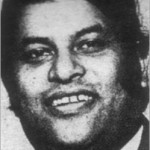BY HOWARD CAMPBELL
Observer senior writer—-

Jimmy Cliff and author Laurence Cane-Honeysett —-
When history of the music business is discussed, the great record labels get their due: Motown, Atlantic, Stax, CBS, Chess, Island. Trojan Records never fits into that August lot.
Trojan, a British company founded by Jamaican Lee Gopthal, introduced many rocksteady and reggae songs to the United Kingdom. Its street-smart promotion earned acts like Jimmy Cliff, Desmond Dekker, Nicky Thomas, John Holt, Tony Tribe, Dave Barker and Ansell Collins and Ken Boothe national acclaim in that country.
The London-based label turns 50 this year, and there are plans to celebrate the landmark. These include a book by Laurence Cane-Honeysett, a Trojan stalwart and student of Jamaican music.
“In terms of the project that I’m working on, it is a coffee table-style book entitled The Story Of Trojan Records, which is to be published in June. Over the years I have been lucky enough to have [had] the opportunity to interview many significant artistes and producers, along with many former Trojan employees and owners, and those who have been involved or influenced by the record label to varying degrees,” he told the Jamaica Observer recently. “The book focuses upon all these various aspects while tracing Trojan’s history from its launch 50 years ago to the present day.”
Cane-Honeysett joined Trojan in 1991 when the company’s thrust was selling compilation albums from its impressive catalog. Trojan has been sold three times since his tenure there and is currently owned by BMG.

Some of the songs which Trojan helped push in the UK national chart are Israelites by Desmond Dekker and The Aces, Wonderful World, Beautiful People (Jimmy Cliff), Tony Tribe (Red, Red, Wine), Bob and Marcia (Young, Gifted and Black), Nicky Thomas (Love of The Common People), Double Barrell (Dave Barker and Ansell Collins) and Everything I Own by Ken Boothe.
For all its trailblazing work and accomplishments, Cane-Honeysett believes Trojan is “largely overlooked”.
“Growing up in an increasingly multicultural Britain during the late 1960’s and early ’70’s as I did, reggae was part and parcel of everyday life, and this was due primarily to Trojan effectively marketing the music, both in this country and elsewhere,” he said. “In addition, a significant part of the income generated from sales in the UK was paid to the Jamaican music makers, who in turn used this money to further develop their own labels, and in some cases recording studios. So Trojan’s success had an immediate impact upon the Jamaican recording industry.”
Antonio “Chips” Richards was a key figure at Trojan, getting songs from Jamaican producers to Gopthal’s record shops in West Indian communities in London, Luton, Shepherd’s Bush and Brixton. Some of those songs, including Everything I Own, eventually entered the national chart.
Born in West Kingston, Richards moved to the UK in the early 1960s and began working in the growing Jamaican music scene. Getting a hit song there for Jamaican artistes, he told the Observer, was massive.
“London was the launching pad for the world and Trojan was like Motown — a brand. Reggae had a home and Trojan was the mother,” he said.
Its father was the unassuming Gopthal who was also born in Kingston. He moved to the UK in 1952 at age 13 to become an accountant, but eventually made his mark in music with small labels before starting Trojan.

After Trojan went into liquidation in 1975, Gopthal gradually left the music industry. He died in 1997.
Richards is one of the persons Cane-Honeysett interviewed for his book. So too Cliff, Dekker, who died in 2006; Derrick Morgan and Chris Blackwell, who played a critical role in the company’s early years.
Blackwell wrote the book’s foreword.
This is Cane-Honeysett’s second book on Trojan Records. The first, Young, Gifted and Black: The Story of Trojan Records, written with Michael de Koningh, was released in 2003.


You must log in to post a comment.